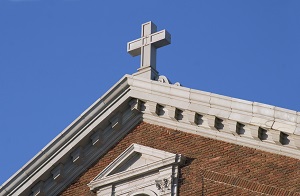 California SB 1146 threatens the existence of around 40 faith-based colleges that rely on the state government for funding. Christianity Today explains how the bill, which purports to advance equality by curtailing important exemptions for religious schools, disproportionately harms students who most depend on grants to attend faith-based schools, while forcing these schools to promote sexual ideology explicitly at odds with their mission:
California SB 1146 threatens the existence of around 40 faith-based colleges that rely on the state government for funding. Christianity Today explains how the bill, which purports to advance equality by curtailing important exemptions for religious schools, disproportionately harms students who most depend on grants to attend faith-based schools, while forcing these schools to promote sexual ideology explicitly at odds with their mission:
The bill’s primary goal is to prevent colleges that receive state funds from enforcing codes of student conduct that reflect the college’s religious beliefs about sexual identity and the confining of marriage to male-female relationships.
Historically, California’s higher-education law, which includes requirements against discrimination based on sexual orientation, sex, and gender identity, has had an exemption allowing a religious college to follow policies based on its religious tenets. The bill would largely undo that exemption, preserving it only for programs “preparing students to become ministers of the religion or to enter upon some other vocation of the religion.” The apparent intent is that colleges that provide a general education from a faith-based perspective will no longer be protected.
…
The bill’s chief sponsor, state senator Ricardo Lara, has said that his goal is to protect LGBT students at religious colleges. The bill’s proponents cite accounts of students being expelled from school, allegedly for coming out as gay or transgender, which consequently causes them to lose time or money invested in that school. Proponents also want to prevent a religious college from, for example, assigning transgender students to housing based on their biological sex at birth or denying married-student housing to same-sex couples. Proponents see these policies as examples of sexual-orientation, sex, and gender-identity discrimination that should not occur in state-funded programs.
Colleges point out that they advertise their standards of conduct to prospective students, and already work to ensure fair treatment of all students. Furthermore, since students have many kinds of schools to select from, the pluralistic system in education that is in place “should not disfavor an institution that follows a distinctive religious-moral perspective, or the students who choose it.” This bill threatens many faith-based colleges in California, but it is not nearly as bad as its previous draft, which was amended due to widespread public outcry:
An earlier version of the bill was so broad that it threatened to bar not only religiously-grounded codes of conduct and statements of faith for faculty and students, but also a host of other religious elements essential to many faith-based colleges such as mandatory chapel attendance or required Bible or religion courses. That version, which passed California’s state senate in May, prompted the previously mentioned public outcry. The bill now provides that a college may “enforce religious practices” as long as it applies them to all students, gay and straight. (That said, some online critiques of the bill are based on its earlier version.)
But the new version still creates serious conflicts. Under it, a college can have religious practices but cannot discriminate based on sexual orientation, sex, or gender identity—or even religious belief. It is likely to mean that religious colleges can follow some aspects of their faith and mission, but not their tenets about marriage and sexual identity.
This bill seems to have initially sought to introduce transparency about religious-based exemptions at faith-based institutions, and to provide a process for addressing unlawful discrimination. Its subsequent versions have sought to regulate the hiring and preventing of students from receiving state-sponsored financial aid. The bill now threatens religious liberty in California, and would weaken educational diversity in the state. There is still time to speak up; the bill has been amended once, and it can be amended again.
If you would like to learn more, visit Opposesb1146.com.



